Podcast
Questions and Answers
किस लिपि का उपयोग तिब्बती बौद्ध वस्त्रों के संस्कृत और हिंदी में लिखने के लिए किया जाता है?
किस लिपि का उपयोग तिब्बती बौद्ध वस्त्रों के संस्कृत और हिंदी में लिखने के लिए किया जाता है?
- पर्सो-अरबी लिपि
- करोशिया लिपि
- नस्तालीक़ लिपि
- शारदा लिपि (correct)
किस स्क्रिप्ट का उपयोग नेपाल के कुछ हिस्सों में हिंदी लिखने के लिए किया जाता है?
किस स्क्रिप्ट का उपयोग नेपाल के कुछ हिस्सों में हिंदी लिखने के लिए किया जाता है?
- नस्तालीक़ लिपि
- शारदा लिपि
- करोशिया लिपि (correct)
- पर्सो-अरबी लिपि
कौन-सी स्क्रिप्ट हिंदी-बोलने वाले मुस्लिम आबादी के लिए भारत और पाकिस्तान में प्रयुक्त होती है?
कौन-सी स्क्रिप्ट हिंदी-बोलने वाले मुस्लिम आबादी के लिए भारत और पाकिस्तान में प्रयुक्त होती है?
- पर्सो-अरबी लिपि (correct)
- शारदा लिपि
- नस्तालीक़ लिपि
- करोशिया लिपि
कौन-सी स्क्रिप्ट हिंदी में संस्कृति और भाषा का महत्वपूर्ण हिस्सा है?
कौन-सी स्क्रिप्ट हिंदी में संस्कृति और भाषा का महत्वपूर्ण हिस्सा है?
कौन-सी स्क्रिप्ट को 'कुमार-संकेत' कहा जाता है?
कौन-सी स्क्रिप्ट को 'कुमार-संकेत' कहा जाता है?
'Unicode' में हैं, हमेशा सही प्रकार से कंप्यूटर, स्मार्‟�्���न्�—�‟�—े�त�्�म्, �”्ल�”्��क�्��न्�—�्�‡ �”्���”्�्��”्� �”्�—े �—” �”्ल �—” प्र�—�प—” �”�”्�—�स�” ”ल—�ंन—” �—” �” ”ल—�ंन�——्�”�——े �”्�—े �——’ �—� �‚‚”””’ �‚ल —ल�—’ —’ल —’ ”ल —‘‚’”ंन—’ —‘‚’”ंन—”, �‚‚” ‘‚‚’ंन” —ल ‘‚‚’ �¥ल —ल” सुन‡ह�–�‚ल —“ंल ‘‚‚’ —ल ““–‘हल ‘‚‚’ �¥ल —ल, ‘ह–ल‘ —’ ““–‘हल — ““ह–ल —ल ““–‘हल —“. ‘ह–ल‘ ““–‘हल ““–हक“ं ‘‚‚’ —“. ‘ह–ल‘ �¥ल ‘स‘”—‘ ––‘हल ‘‚‚’ —“. ‘ह–ल‘ ––‘हल “–“�’. ...'
'Unicode' में हैं, हमेशा सही प्रकार से कंप्यूटर, स्मार्‟�्���न्�—�‟�—े�त�्�म्, �”्ल�”्��क�्��न्�—�्�‡ �”्���”्�्��”्� �”्�—े �—” �”्ल �—” प्र�—�प—” �”�”्�—�स�” ”ल—�ंन—” �—” �” ”ल—�ंन�——्�”�——े �”्�—े �——’ �—� �‚‚”””’ �‚ल —ल�—’ —’ल —’ ”ल —‘‚’”ंन—’ —‘‚’”ंन—”, �‚‚” ‘‚‚’ंन” —ल ‘‚‚’ �¥ल —ल” सुन‡ह�–�‚ल —“ंल ‘‚‚’ —ल ““–‘हल ‘‚‚’ �¥ल —ल, ‘ह–ल‘ —’ ““–‘हल — ““ह–ल —ल ““–‘हल —“. ‘ह–ल‘ ““–‘हल ““–हक“ं ‘‚‚’ —“. ‘ह–ल‘ �¥ल ‘स‘”—‘ ––‘हल ‘‚‚’ —“. ‘ह–ल‘ ––‘हल “–“�’. ...'
हिन्दी भाषा के लिए कौन-सा स्क्रिप्ट प्राथमिक रूप से प्रयोग किया जाता है?
हिन्दी भाषा के लिए कौन-सा स्क्रिप्ट प्राथमिक रूप से प्रयोग किया जाता है?
हिन्दी के लिए देवनागरी स्क्रिप्ट किसके आधार पर है?
हिन्दी के लिए देवनागरी स्क्रिप्ट किसके आधार पर है?
हिन्दी के लिए कितने स्वर और व्यंजन होते हैं देवनागरी स्क्रिप्ट में?
हिन्दी के लिए कितने स्वर और व्यंजन होते हैं देवनागरी स्क्रिप्ट में?
किस स्क्रिप्ट से देवनागरी स्क्रिप्ट का विकास हुआ?
किस स्क्रिप्ट से देवनागरी स्क्रिप्ट का विकास हुआ?
कैसे लिखा जाता है देवनागरी स्क्रिप्ट में?
कैसे लिखा जाता है देवनागरी स्क्रिप्ट में?
कौन-सा पुराण SYSTEMS HINDI को लेखन के लिए प्रोत्साहित करता है?
कौन-सा पुराण SYSTEMS HINDI को लेखन के लिए प्रोत्साहित करता है?
Flashcards are hidden until you start studying
Study Notes
Hindi: The Language and Its Script
Hindi, a member of the Indo-Aryan family of languages, is one of the most widely spoken languages in the world. Besides its significance as a communication tool, Hindi also boasts a rich and distinct script that adds to its cultural and linguistic allure.
The Hindi Script
Hindi primarily uses the Devanagari script, which originated in the Indian subcontinent around the 5th century CE. Devanagari is an abugida script, meaning each character is based on a consonant-vowel combination. This script is also used to write Sanskrit, Marathi, Nepali, and several other Indo-Aryan languages.
The Devanagari script consists of 11 vowels and 33 consonants, providing a flexible and comprehensive system for writing Hindi. Each consonant-vowel combination is denoted by a single character, and vowels can be added as diacritic marks above or below the consonant. The script is written from left to right, and words are generally written without spaces between them.
The Evolution of the Hindi Script
The Devanagari script evolved from the Brahmi script, one of the earliest scripts used in the Indian subcontinent. Over time, the Brahmi script underwent several modifications to accommodate the unique features of Sanskrit, Hindi, and other Indo-Aryan languages.
The development of the Devanagari script is closely linked with the rise of Sanskrit, India's classical language. Sanskrit was one of the first languages written using the Devanagari script, and it helped shape the script's current form.
Variants of the Hindi Script
While the Devanagari script is the primary script used for writing Hindi, there are several variants and adaptations that have emerged over the years. One variant, called the Sharada script, is used to write Tibetan Buddhist texts in Sanskrit and Hindi. The Karoshiya script, another variant, is used in some parts of Nepal to write Hindi.
Moreover, the Devanagari script is not the only script used to write Hindi. The Perso-Arabic script, known as Urdu script, is also used by the Hindi-speaking Muslim population in India and Pakistan. This script is similar to the Nastaliq script used to write Persian and Urdu.
The Hindi Script and Technology
The Devanagari script has been successfully adapted for use on digital devices and computers. Unicode, a universal character encoding standard, includes all the characters needed to write Hindi. This standard ensures that Hindi text is displayed correctly on computers, smartphones, and other digital devices.
In recent years, there has been a growing interest in developing software and tools to help preserve and promote the Devanagari script. These tools include fonts, text input methods, and other resources that make it easier for people to learn and use the script.
Conclusion
The Hindi script, and specifically the Devanagari script, is an essential component of Hindi culture and language. Its evolution and adaptability have helped Hindi maintain its relevance in modern society, and its use in digital devices ensures that it will continue to thrive in the future. As we continue to learn more about the Devanagari script and its history, we gain a deeper appreciation for the rich cultural heritage of Hindi and the Indo-Aryan languages.
Studying That Suits You
Use AI to generate personalized quizzes and flashcards to suit your learning preferences.




